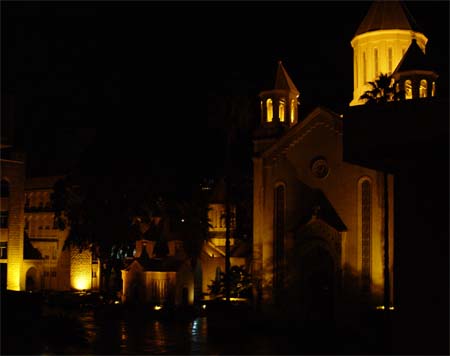Iíve often wanted to hold onto that first feeling of disorientation when arriving in a new setting, so quickly things begin to feel familiar. Already I am learning the ropes here at the Armenian Catholicosate (thatís ďka-tho-licos-ateĒ), and much of this is due to the fact that my hosts are going to great lengths to make me feel at home. Several times a day, I am asked, ďIs there anything you need? Anything I can do for you?Ē And of course there have been a few things Iíve needed. A few more hangers, for instance: while visiting the Ecumenical Relations Department, Mariam, the secretary there, tells me that the gate keeper, Toros, has hangers for me. How did she know I needed hangers? My visit to her office was haphazard, my request for more hangers made to someone else in another part of the compound. Everyone here is working in concert, in a general sort of way all of the time, and in a specific sort of way to make me feel as much at home as possible. No where is this culture of concerted enterprise more evident than in the times we gather, twice daily, for prayers in the Cathedral: concertos of movement, bows, salutations, incensing, chant and prayer: everyone on the same page, and why not, theyíve been doing this for more than 1700 years!
Language in the Middle East is a complicated affair. French seems the preferred second language (Arabic the first) of East Beirut, and Iíve had conversations in both English and French in the Catholicosate. At supper I enjoyed a pleasant conversation in French with my counterpart here, the priest in charge of the Cathedral, Fr. Norayr. His mastery of languages is quite impressive, to say the least. After 17 years serving a parish in north-eastern Syria (over 100,000 Armenians in that land), he came away with fluent Turkish and Kurd. Add this to his native Armenian (classic and modern) and already fluent Arabic (He his a native of Syria). His French and English are quite solid; Greek, pretty good (served there too.) My two languages are an asset here to be sure, but compared to folks like Fr. Norayr, itís clear I can be counted among the more linguistically challenged.
I am trying to learn a little Armenian, the alphabet is challenge, have a look: http://www.omniglot.com/writing/armenian.htm










